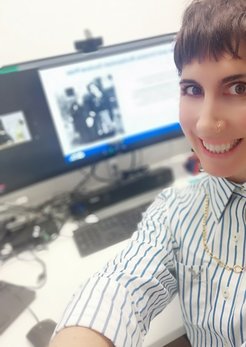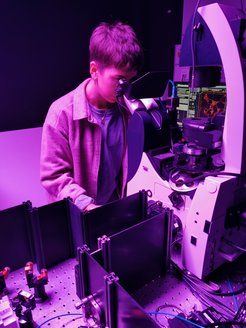Jessica Matthias receives Richtzenhain Doctoral Prize
The former PhD student and current postdoc in the Optical Nanoscopy Department is honored for her outstanding dissertation
Jessica Matthias, former PhD student and current postdoc in the Optical Nanoscopy Department (Prof. Dr. Stefan W. Hell) at the Max Planck Institute for Medical Research in Heidelberg, received the Richtzenhain Doctoral Prize in November 2021. It is awarded for outstanding dissertations in the field of cancer research that have been successfully completed at a research institute in Heidelberg or the University of Heidelberg. The Richtzenhain Doctoral Prize is endowed by the Walther and Christine Richtzenhain Foundation and awarded by the DKFZ. Up to five prizes of 2.000 € are awarded every two years.

When asked what receiving this honor means to her, Jessica Matthias said: “Simple question, simple answer - it means a lot! Beyond the overall happiness, I feel a mix of honor, gratitude, satisfaction and humility. It is of utmost importance to me to thank a wonderful team of colleagues, and most certainly to gratefully acknowledge the inspiring and ongoing collaborations I have established during my PhD time. As a biophysical chemist foreign to cancer research, having my PhD work honored as a small but important contribution to the field is a wonderful recognition of my dedication for my recent years of work, but an even greater boost of motivation for the coming years.”
Jessica Matthias’s research
Her research highlights the potential of implementing an integrated multidisciplinary workflow for fluorescence nanoscopy imaging studies in biomedical research. The individual projects of her work as a PhD student addressed different aspects of basic and preclinical cancer research and for the first time, introduce Stimulated Emission Depletion (STED) imaging as a powerful tool to biomedical applications such as clinical diagnostics, which to date are unexplored by STED nanoscopy. As an example, the preclinical research collaboration with Dr. Ann-Christin Eder (Department of Nuclear Medicine, University Medical Center, Freiburg) pursues the potential of targeted imaging and therapy to bridge the shortcomings of established cancer treatments.

“In diagnostics and treatment of prostate cancer, targeted imaging and therapy based on novel Prostate-specific Membrane Antigen (PSMA) inhibitors have been a game changer, but the subcellular fate of PSMA/PSMA inhibitor complexes constituted an open question. Our study gives pioneering insights into intracellular distribution patterns of PSMA and of low molecular weight PSMA inhibitors down to the molecular level and at clinically relevant time points by combining positron emission tomography (PET) imaging and STED nanoscopy. Our findings will boost the future design and development of novel radio-theranostics for refined and/or new molecular targeted diagnostic and therapeutic approaches in the field of prostate cancer, with the goal of specializing patient care,” explains Jessica Matthias.

